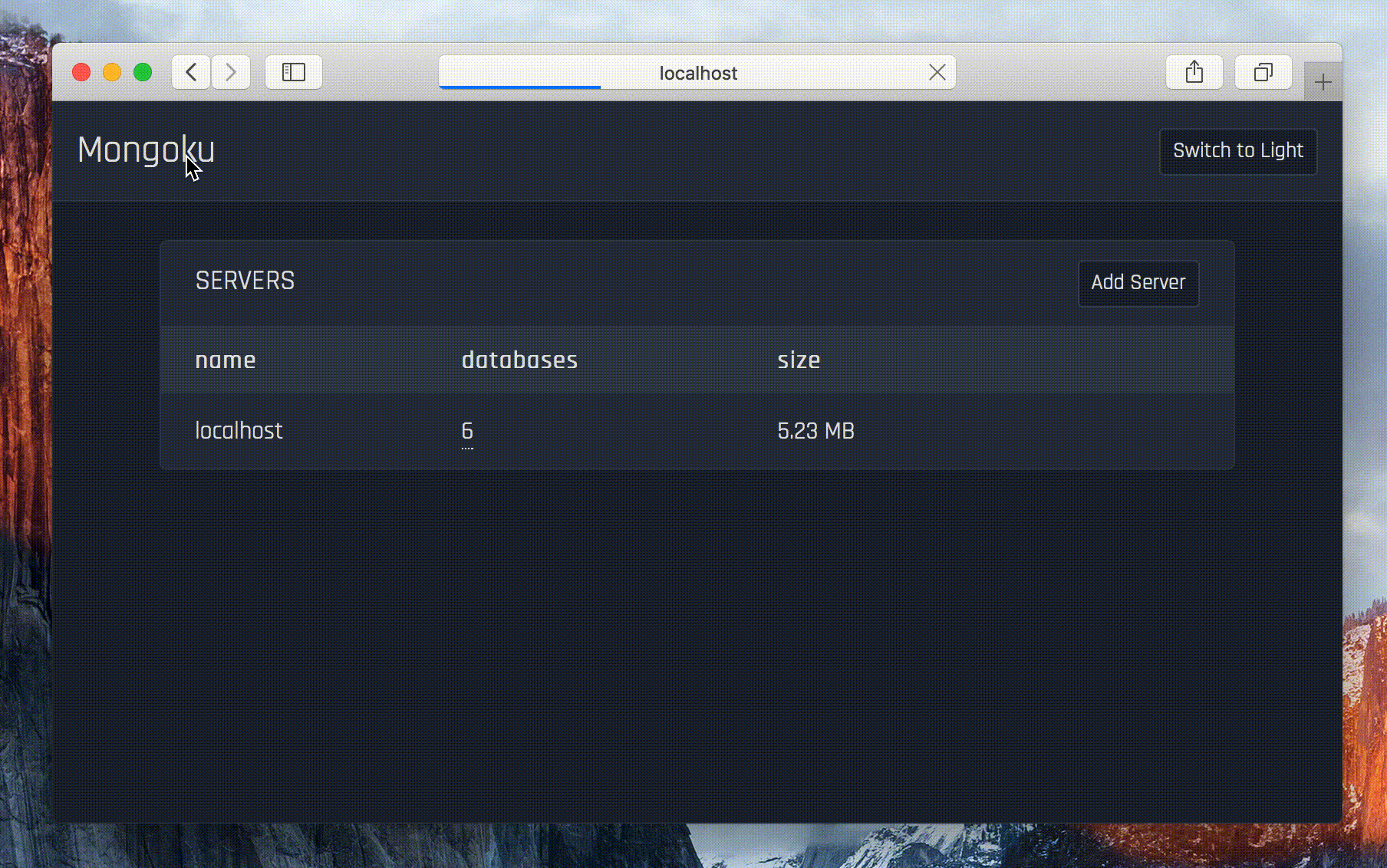@hola.org/mongoku
v1.4.4-hola.0
Published
 # Mongoku
Downloads
18
Maintainers
Readme
Mongoku
MongoDB client for the web. Query your data directly from your browser. You can host it locally, or anywhere else, for you and your team.
It scales with your data (at Hugging Face we use it on a 1TB+ cluster) and is blazing fast for all operations, including sort/skip/limit. Built on TypeScript/Node.js/Angular.
Demo

Install & Run
This is the easy and recommended way of installing and running Mongoku.
# Install
npm install -g mongoku
# Run from your current terminal
mongoku startYou can also run Mongoku as a daemon, using either PM2 or Forever.
mongoku start --pm2
# or
mongoku start --foreverDocker
Using the Docker HUB image
docker run -d --name mongoku -p 3100:3100 huggingface/mongoku
# Run with customized default hosts
docker run -d --name mongoku -p 3100:3100 --env MONGOKU_DEFAULT_HOST="mongodb://user:[email protected]:8888" huggingface/mongokuBuild your own image
If you want to build your own docker image, just clone this repository and run the following:
# Build
docker build -t yournamehere/mongoku .
# Run
docker run -d --name mongoku -p 3100:3100 yournamehere/mongokuManual Build
If you want to manually build and run mongoku, just clone this repository and run the following:
# Install deps and build everything
./run.sh
# Run
npm startConfiguration
You can also specify a few things using environment variables:
# Use some customized default hosts (Default = localhost:27017)
MONGOKU_DEFAULT_HOST="mongodb://user:password@localhost:27017;localhost:27017"
# Use another port. (Default = 3100)
MONGOKU_SERVER_PORT=8000
# Use a specific file to store hosts (Default = $HOME/.mongoku.db)
MONGOKU_DATABASE_FILE="/tmp/mongoku.db"
# Timeout before falling back to estimated documents count in ms (Default = 5000)
MONGOKU_COUNT_TIMEOUT=1000
# Timeout before aborting find query in ms (Default = 300000)
MONGOKU_QUERY_TIMEOUT=5000
# Session secret
MONGOKU_SESSION_SECRET="keyboard cat"
# Authentication endpoint. This address will be used to authenticate users
MONGOKU_AUTH_ENDPOINT=http://localhost/auth
# Disable authorization (allow any requests), useful for debugging environment
MONGOKU_DISABLE_AUTH=true
# MONGOKU_EXT_SESSION_COOKIE and MONGOKU_EXT_SESSION_ENDPOINT enable
# "external session auth" mode when a request to the api may be authorized
# using web session managed by another appication.
# If the given cookie is present on a request to the api
# mongoku server mades request to MONGOKU_EXT_SESSION_ENPOINT with that cookie
# to get the current user.
MONGOKU_EXT_SESSION_COOKIE="app.sid"
# The given endpoint must accept GET request with MONGOKU_EXT_SESSION_COOKIE set
# and response with json {"login":"<curret_user_login>"} if session is valid
# or 40x code otherwise.
MONGOKU_EXT_SESSION_ENDPOINT=http://localhost/whoami